Nimodipine
Uses
Nimodipine is used in the treatment of angina (heart-related chest pain), arrhythmia, hypertensive emergencies, subarachnoid hemorrhage, and anal fissures.
How it Works
How Nimodipine works: Nimodipine is a calcium channel blocker that relaxes the narrow blood vessels in the brain, facilitating easier blood flow. This action helps prevent brain damage following bleeding around the brain.
Side Effects
Common side effects of Nimodipine include headache, nausea, and hypotension (low blood pressure).
Expert Advice
- Take Nimodipine as per the dose and duration suggested by your doctor.
- A sudden drop in blood pressure may occur, especially when you first start taking Nimodipine.
- To reduce the chance of feeling dizzy or passing out, rise slowly if you have been sitting or lying down.
- Your doctor will monitor your blood pressure and heart rate during treatment with this medicine.
- Do not take any antacids for 2 hours before or after taking Nimodipine, as it may affect the efficacy of the medicine.
- Inform your doctor if you are pregnant, planning a pregnancy, or breastfeeding.
- Nimodipine has been prescribed to improve your blood pressure and/or to reduce the number and severity of angina attacks.
- Lowering blood pressure reduces the risk of future heart attacks and strokes.
- Take it at the same time every day to help you remember to take it.
- It can cause ankle or foot swelling; to reduce swelling, raise your legs while sitting.
- Consult your doctor if the swelling does not go away.
- It may cause dizziness; do not drive or perform any activity that requires mental focus until you know how Nimodipine affects you.
Related Medications
Nimodipine 30mg

₹65.2
MRP ₹130.3
Nimodipine 30mg

₹149

₹65.2
MRP ₹130.3
Nimodipine 30mg
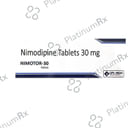
₹175

₹65.2
MRP ₹130.3
Nimodipine 30mg

₹160

₹65.2
MRP ₹130.3
Nimodipine 30mg

₹134

₹65.2
MRP ₹130.3
Nimodipine 30mg
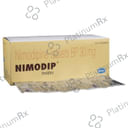
₹264.5

₹65.2
MRP ₹130.3
Nimodipine 30mg

₹29.9

₹65.2
MRP ₹130.3
Nimodipine 30mg

₹60

₹65.2
MRP ₹130.3
Nimodipine 30mg

₹90.9

₹65.2
MRP ₹130.3
Nimodipine 30mg

₹139

₹65.2
MRP ₹130.3
Nimodipine 30mg

₹160

₹65.2
MRP ₹130.3
Nimodipine 30mg
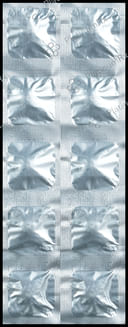
₹218

₹65.2
MRP ₹130.3
Nimodipine 30mg
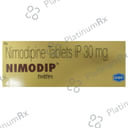
₹233.2

₹65.2
MRP ₹130.3
Nimodipine 30mg

₹178

₹65.2
MRP ₹130.3
Nimodipine 30mg

₹97.9

₹65.2
MRP ₹130.3
Nimodipine 30mg

₹211

₹65.2
MRP ₹130.3
Nimodipine 30mg

₹105
Nimodipine 10mg

₹778
Nimodipine 50mg

₹590
Nimodipine 10mg

₹710
Nimodipine 10mg

₹495
Nimodipine 10mg
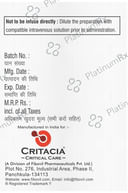
₹790
Nimodipine 10mg

₹932.4
Nimodipine 10mg

₹99
Flat ₹100 off on first app order | Use Code: APP100 |
Flat ₹100 off on first app order
USE CODE: APP100

Download Now